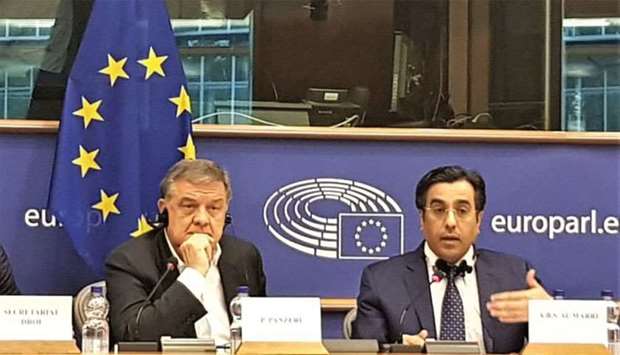President of the National Human Rights Committee (NHRC) Dr Ali bin Smaikh al-Marri has called on the European Parliament to adopt urgent and effective mechanisms and procedures to end the suffering of those affected by the blockade imposed on Qatar.
He also called for including human rights conditions resulting from the blockade in the European Parliament's annual report, expressing hope that the violations resulting from the blockade of Qatar will be a priority among human rights issues to be discussed at the European Parliament in the coming period.
Speaking at a hearing in the European Parliament in Brussels, Al-Marri urged European Union's envoy to visit Qatar and the blockading countries to get a close look at human rights violations committed by Saudi Arabia, the UAE and Bahrain.
He also made a similar invitation to the European Parliament's human rights committee.
He stressed that after nearly a year after the blockade, the suffering of the victims continues. They no longer trust the statements of condemnation, and are demanding the need for concrete and effective measures to redress them.
He pointed out that, contrary to the allegations of the blockading countries, they have not taken any action to stop the violations, but launched campaigns to challenge the credibility of those who issued and defame them, and continue to practice political disinformation and escape forward and the fall of public opinion baseless promises, and the establishment of committees to prolong the crisis and try to gain time, Suffering of victims.
In this context, he referred to the visit of the delegation of the United Nations High Commissioner for Human Rights (OHCHR) to the State of Qatar after which they issued a comprehensive report on the violations of the blockade.
There were also the appeals of the High Commissioner for Human Rights and the Special Rapporteur on freedom of opinion and expression, as well as the issuance of reports from 220 international organizations and trade unions who condemned the 13 demands of the blockading countries, including the closure of Al-Jazeera and all Qatari media, as well as the letters of six special rapporteurs of the UN Human Rights Council to the Saudi Emirati and Bahraini governments, which called on them to take immediate action to stop discriminatory and arbitrary measures, and accountability Tuaduha the perpetrators of the violations.
In response to a question on the extent of the commitment of the blockading countries to lifting restrictions on the right to practice religious rights of citizens and residents in Qatar, the President of the NHRC said that pilgrims from Qatar cannot go to Al Haj or Umrah, one year after the beginning of the blockade.
He added that the Committee intended to invite the Special Rapporteur on freedom of belief to issue an urgent appeal to the Saudi authorities for their continued violation of the right to practice religious rights, and also to visit Qatar and Saudi Arabia in order to assess the extent of suffering and politicization of religious feelings and to monitor citizens and residents right to Haj and Umrah.
In the same context, he called on the Special Rapporteur on freedom of belief to include in his annual report to the Human Rights Council the issue.
The European Parliament's invitation to the President NHRC is a reflection of the Committee's efforts to convince international public opinion of the credibility of its reports.

Al-Marri urged European Union's envoy to visit Qatar and the blockading countries to get a close look at human rights violations committed by Saudi Arabia, the UAE and Bahrain.


